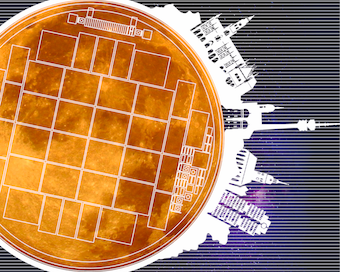Speaker
Description
In this contribution we describe the project "Resistive AC-Coupled Silicon Detectors" (RSD), a novel approach to the design of Low-Gain Avalanche Detectors (LGAD) that will eliminate the problem arising from the segmentation of the gain layer.
RSD are essentially LGAD designed to reach the limit of 100% in the fill-factor. Such scheme is based on the presence of a resistive n-electrode, necessary to store the charges for an opportune discharging time, and a top layer, which induces a capacitive signal on the readout pads.
Since the AC-coupling does not need for the segmentation of active areas, RSD will completely eliminate the dead space between pixels, i.e. the no-gain region used in the present technology for the insulation between neighboring sensors.
This improvement will be beneficial in most of particle physics applications, especially in high-luminosity environments, where 4D tracking needs for the most uniform response, in terms of both geometrical acceptance and detection efficiency.
Preliminary numerical simulations are presented, and the most important physical and technological parameters of RSD are also discussed.
